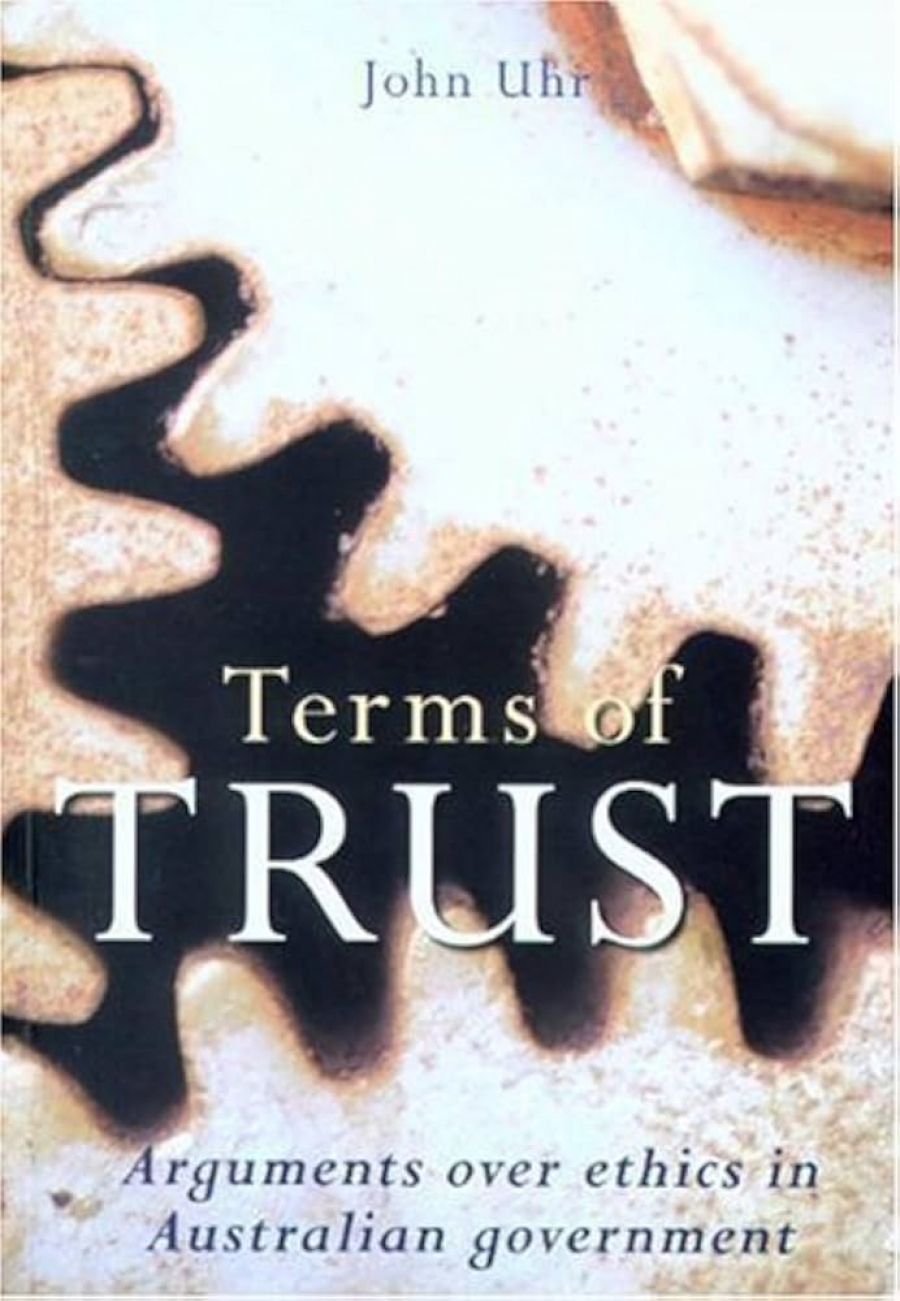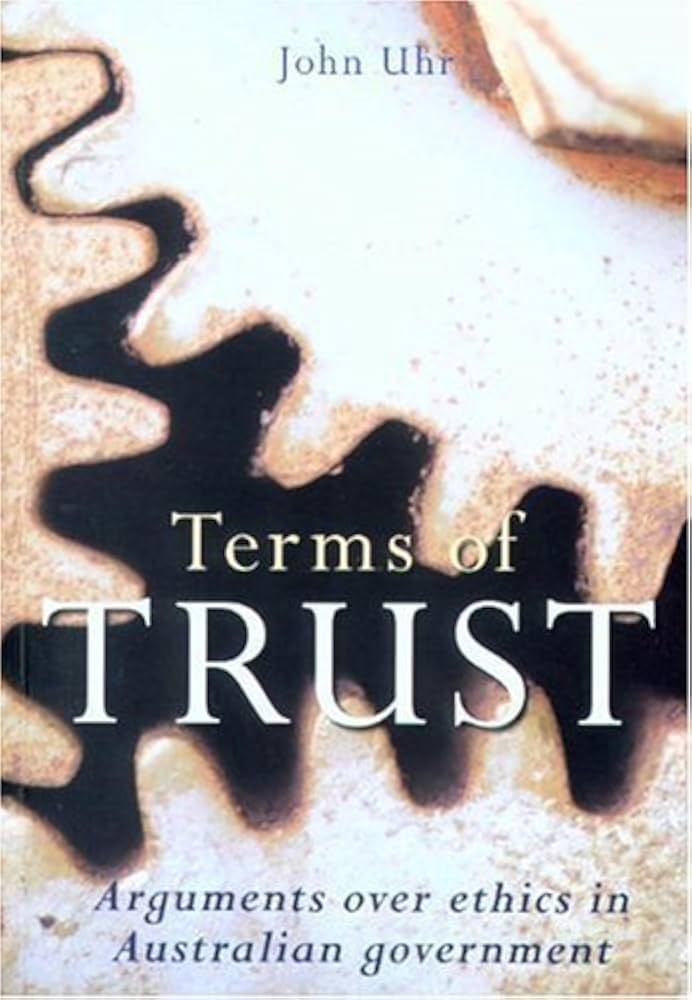
- Free Article: No
- Contents Category: Non-fiction
- Review Article: Yes
- Article Title: Lattice of leadership
- Online Only: No
- Custom Highlight Text:
There are two approaches to public affairs. The first assumes that élites ‘have and have always had the same passions’ (Machiavelli): leaders will do whatever it takes to retain power and to attain their objectives, tempered only by knowing that the popular verdict will depend on success. Success is judged by results: resort to devious or ruthless means will be excused if the people see beneficial outcomes. You can expect leaders to be driven by ambition and self-interest, but trust them to do enough to forestall a popular uprising that might bring them down. Machiavelli was not writing about democracy.
- Book 1 Title: Terms of Trust
- Book 1 Subtitle: Arguments over ethics in Australian government
- Book 1 Biblio: UNSW Press, $39.95 pb, 237 pp
- Book 1 Cover Small (400 x 600):

- Book 1 Cover (800 x 1200):

The second assumes that public affairs should be managed to achieve the public good and that leaders owe it to followers to strive for that and to give citizens enough information to assess the honesty of their efforts. This is the ideal of democracy. The terms of trust relate to a compact between leaders and followers: that objectives will be stated; that public officials will act with integrity; and that intentions, actions and outcomes will be sufficiently transparent to allow for citizen judgment. Politics is caught in tension between the realism of the first approach and the idealism of the second. Is holding power a gamble between what you can get away with while maintaining public acceptance, or is it about building moral capital that inspires trust?
Liberal democracy is realist in accepting that élite self-interest is always part of the equation. But adverse potentials can be contained and the public good advanced if institutions restrain élites (hence the checks and balances between the different arms of government), if civic virtue is encouraged and if systems ensure accountability. But all is not well. There has been a precipitate decline in trust in government. John Uhr is prompted to review the issues of trust and of the ethics of government, to ask what can be done to improve things. We must take ethics seriously, because the failure of confidence in government can undermine democracy.
Uhr works through four stages. First, there is a subtle reading of two early twentieth-century observers of Australian politics, Henry Jones and James Bryce. Jones (the idealist) argued that mutual obligation could curb self-interest, that civic virtue could be encouraged by right practice, that statesmanship entailed moral judgment. Bryce (the realist) talked about institutions – especially the constitution – and their effects in creating the channels to curb what is adverse and to encourage the good. Uhr recovers a context where ethics was ‘taken seriously’, and reveals a heritage on which we might draw: Jones spoke for the ethic that influenced leaders such as Alfred Deakin; Bryce illustrated what was good in Australian arrangements – we produced systems that worked.
Second, Uhr looks at leadership. His dichotomy is between ‘prudential’ and populist leadership. Prudential leaders guard against mistakes by taking the broadest range of advice and by reaching the best judgment in the circumstances, having regard to all the evidence. The challenge for democracies ‘is to structure public decision making so that the large body of active political participants can come to an agreement in support of the best leadership advice available’. Populist leaders claim to speak for ‘the people’ against threat – in naming the threat, they demonise some minorities in order to gain legitimacy with a majority – a divisive, ultimately destructive tactic. How, then, to structure public decision making to encourage ‘prudence’ and to preclude populism?
Uhr’s response is a concept, ‘the lattice of leadership’ – leadership diffused across institutional spheres, but constrained to work collectively for the common good, with each élite challenged to do its best by being held to account by leaders in another sphere. When one element, typically executive government, becomes too dominant, the ethical constraint of the lattice breaks down – and here Uhr’s excellent chapter on national security initiatives as a war against ethics provides much to think about.
Third, Uhr reviews government practice – the introduction of regulatory codes, and the debate over responsibility (to an internalised ethic) versus accountability (to a transparent code of practice). The preoccupation with accountability signifies officialdom’s attempt to re-establish the terms of trust in the face of diminishing public confidence by demonstrating compliance with transparent codes. The familiar dichotomy emerges: a realist code aims to prevent corruption (the NSW Independent Commission Against Corruption); an idealist approach aspires to prevent corruption but also to instil an ethic of commitment to the public good (Queensland’s Criminal Misconduct Commission and its Public Ethics Act).
Regulation dominates current ‘good governance’ literature, and Uhr is scrupulous in showing where gains have been made, and what the limits are. But – and this is Uhr’s fourth point – ‘governments get ethics wrong when they think that the problem is solved by more rules and regulations’. Compliance with a rule intended to prevent a breach of the public interest is not the same as aspiring to an objective that promotes the public interest. Loyalty to a code of ‘official duty’ to the government of the day might indeed be in conflict with a conscientious official’s duty to the truth.
None of these issues is simple, and introducing them unleashes a host of different perspectives: Uhr is intent on addressing them all. It would misrepresent his lapidary and erudite book to suggest that his discussion is as simple as the summary above might imply. On the other hand, if there is a criticism, it is that he is so measured, so keen to register all positions, that you are occasionally caught wondering where it is going – but he brings all triumphantly together in the end.


Comments powered by CComment